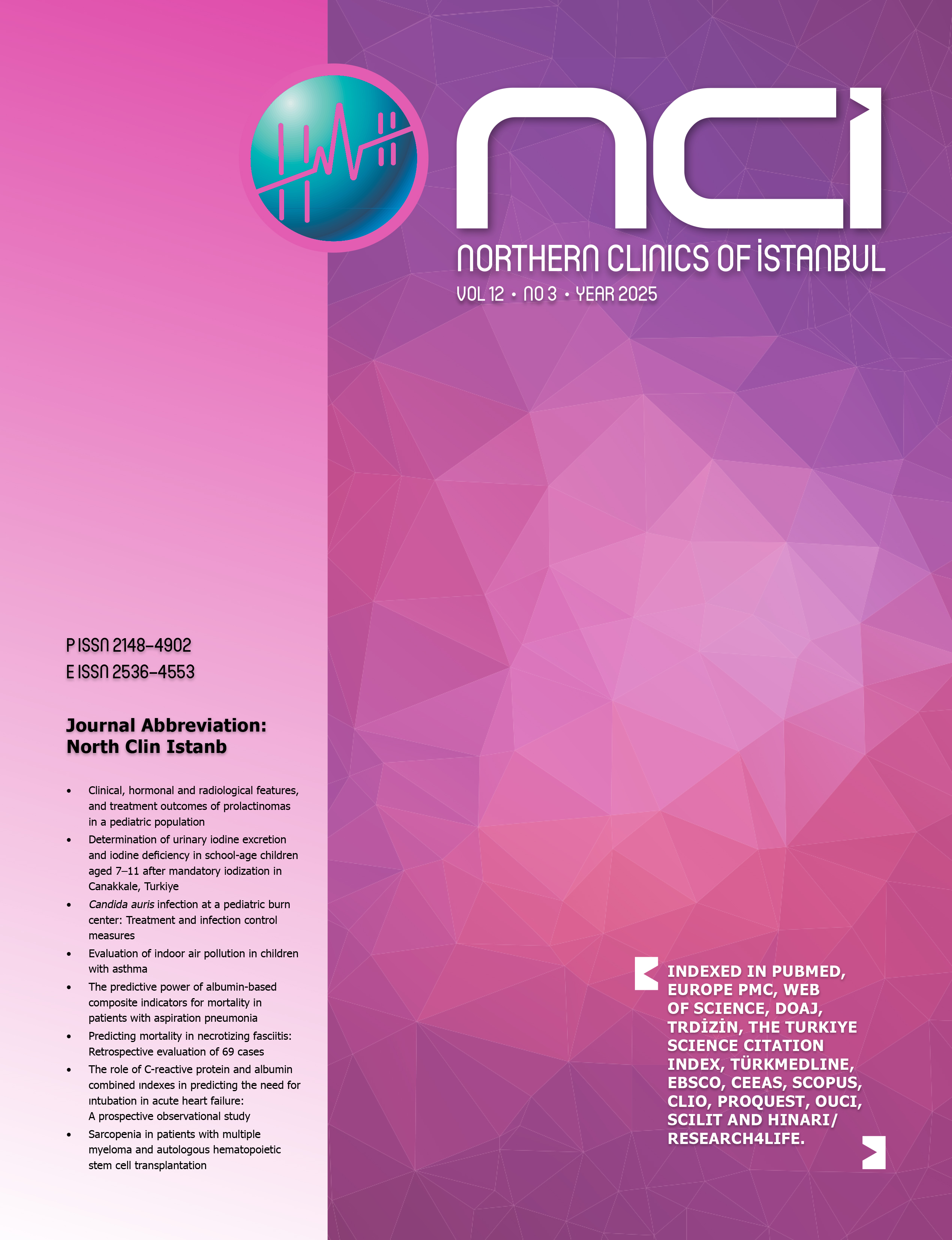The clinical significance of anti-DFS70 autoantibodies and its correlation with Vitamin D levels
Alev Cetin Duran1, Nihan Cuzdan2, Tugba Kula Atik31Medical Microbiology and Basic Immunology Laboratory, Balikesir Ataturk City Hospital, Balikesir, Turkiye2Department of Rheumatology, Balikesir Ataturk City Hospital, Balikesir, Turkiye
3Department of Microbiology, Balikesir University Faculty of Medicine, Balikesir, Turkiye
OBJECTIVE: This study aims to investigate the clinical significance of anti-dense fine speckled 70 (DFS70) autoantibodies and its association with systemic autoimmune rheumatic diseases (SARD) related autoimmune markers and Vitamin D levels.
METHODS: The study group consisted of 281 (mean age±SD: 45.31±15.89 years; 88.3% female) anti-DFS70 autoantibody-positive patients. All patients sera in the study group were tested by ANA HEp-2 indirect immunofluorescent antibody (IIF) and immunoblotting (IB) methods (Euroimmun AG, Lübeck, Germany). Anti-DFS70 antibody-positive patients were divided into two subgroups. Anti-DFS70 antibody-positive patients with SARD were assigned as Group 1 (n=43), anti-DFS70 antibody-positive patients without SARD were assigned as Group 2 (n=238). A control group with anti-DFS70 negative patients with SARD were assigned as Group 3 (n=49, mean age±SD: 49.86±12.08; 79.6% female). The clinical characteristics, erythrocyte sedimentation rate (ESR), C-reactive protein (CRP), neutrophil/lymphocyte ratio, thrombocyte/lymphocyte ratio (TLR), rheumatoid factor (RF), anti-cyclic citrullinated peptide (anti-CCP), and 25-hydroxyvitamin D3 (25OHD3) levels were compared between three groups.
RESULTS: The majority (61.9%) of anti-DFS70 antibody positive patients had no specific diagnosis. Other systemic diseases were detected as allergic diseases (10.0%), hematological abnormalities (5.0%), thyroid diseases (3.6%), gastrointestinal system diseases (1.8%), malignancies (1.4%), and infections (1.1%). ESR, CRP levels, and TLR were lower in Group 2 than Groups 1 and 3 (p<0.05). RF and anti-CCP positivity rates were lower in Group 2 when compared with Groups 1 and 3 (p<0.05). 25OHD3 levels did not differ between three groups (p=0.103).
CONCLUSION: We observed that anti-DFS70 autoantibody may be associated with organ-specific autoimmune diseases, allergic diseases, and hematological disorders. Therefore, it is essential to evaluate these pathologies in patients positive for anti-DFS70 antibodies.
Anti-DFS70 otoantikorlarının klinik önemi ve D vitamini ile ilişkisi
Alev Cetin Duran1, Nihan Cuzdan2, Tugba Kula Atik31Balıkesir Atatürk Şehir Hastanesi, Tıbbi Mikrobiyoloji ve Temel İmmünoloji Laboratuvarı, Balıkesir2Balıkesir Atatürk Şehir Hastanesi, Romatoloji Kliniği, Balıkesir
3Balıkesir Üniversitesi Tıp Fakültesi Mikrobiyoloji Anabilim Dalı, Balıkesir
Giriş: Bu çalışma, anti-dense fine speckled 70 (DFS70) otoantikorunun klinik önemini ve sistemik otoimmün romatizmal hastalıklar (SORH) ile ilişkili otoimmün belirteçler ve D vitamini düzeyleri ile ilişkisini araştırmayı amaçlamaktadır.
Yöntem: Çalışma grubu 281 (ortalama yaş±SS: 45.31±15.89 yaş; %88.3ü kadın) anti-DFS70 otoantikoru pozitif hastadan oluşmakta idi. Çalışma grubundaki tüm hastaların serumları ANA HEp-2 indirek immünfloresan antikor (IIF) ve immünblot (IB) yöntemleri (Euroimmun AG, Lübeck, Almanya) ile çalışıldı. Anti-DFS70 antikoru pozitif olan hastalar iki alt gruba ayrıldı. SORH olan ve anti-DFS70 antikoru pozitif saptanan hastalar Grup 1 (n=43), SORH olmayan ve anti-DFS70 antikoru pozitif hastalar Grup 2 (n=238) olarak adlandırıldı. Kontrol grubu olarak anti-DFS70 negatif SORH olan hastalar Grup 3 olarak belirlendi (n=49, ortalama yaş±SD: 49.86±12.08; %79.6sı kadın). Klinik özellikler, eritrosit sedimentasyon hızı (ESR), C-reaktif protein (CRP), nötrofil/lenfosit oranı (NLO), trombosit/lenfosit oranı (TLO), romatoid faktör (RF), anti-siklik sitrülinlenmiş peptit antikoru (anti-CCP) ve 25-hidroksivitamin D3 (25OHD3) düzeyleri üç grup arasında karşılaştırıldı.
Bulgular: Anti-DFS70 antikoru pozitif hastaların çoğunluğunun (%61.9) spesifik bir tanısı yoktu. Diğer sistemik hastalıklar ise alerjik hastalıklar (%10.0), hematolojik anormallikler (%5.0), tiroid hastalıkları (%3.6), gastrointestinal sistem hastalıkları (%1.8), maligniteler (%1.4) ve enfeksiyonlar (%1.1) olarak tespit edildi. ESR, CRP düzeyleri ve TLO Grup 2'de Grup 1 ve Grup 3'e göre daha düşüktü (p<0.05). RF ve anti-CCP pozitiflik oranları grup 2'de grup 1 ve grup 3'e göre daha düşüktü (p<0.05). 25OHD3 seviyeleri üç grup arasında farklılık göstermedi (p=0.103).
Sonuç: Anti-DFS70 otoantikorunun organa özgü otoimmün hastalıklar, alerjik hastalıklar ve hematolojik bozukluklarla ilişkili olabileceğini gözlemledik. Bu nedenle, anti-DFS70 antikoru pozitif olan hastalarda bu patolojilerin araştırılması gereklidir. (NCI-2021-6-13)
Manuscript Language: English





















